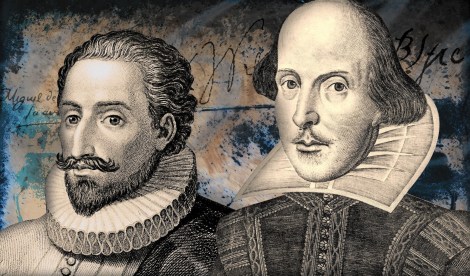The first day of this year’s Pesah, the 22nd and 23 of April, marked 400 years since the passing of two great literary giants. Englishman William Shakespeare and Spaniard Miguel de Cervantes died a day apart from each other in 1616. Shakespeare is beloved for his plays, sharp whit and tongue. Cervantes introduced the notion of the novel through his Don Quixote. However, their works also relate to Western Sephardim and to Passover, and I don’t just mean our extra pound of flesh!

Jews are not explicit in Cervantes. However, the experience of the Jews in Spain may be at the heart of his novel Don Quixote and its mocking treatment of the Inquisition (credit to Dr. Ronnie Perelis). Don Quixote imagines himself to be a knight as he attempts to fulfil Spanish notions of chivalry in doing battle with imaginary foes. The story explains that Don Quixote became so immersed in Spanish stories of chivalry that they became his reality. To combat this psychological disease a priest is brought into his home to search his library and rid it of all of its ‘dangerous’ books of chivalry. Don Quixote is a humorous and entertaining tale, but it is also a commentary on Spanish society and the Inquisition at the end of the 16th century. Might not Don Quixote actually be a euphemism for a marrano, a person living a double life? Is not the ridiculous purging of his library actually a rebuke of the Inquisition’s list of banned books? Fundamentally, Don Quixote might be seen as a critique of the Inquisition and the Inquisitions’s treatment of the Converso community.
Shakespeare’s place in Jewish memory is more troubling. He authored The Merchant of Venice, with its upsetting anti-semitic depiction of the Jewish Shylock. Shakespeare’s Shylock lives in relative freedom in 16th century Venice. Indeed, if Shylock was real, he likely was a former converso as were so many of the Venice’s actual Jewish merchants. Shakespeare’s Shylock, however, is the quintessential medieval Jewish caricature. He is a money lender, he lacks mercy or charity, and he is obsessed with the law. And yet, for one of the first times in literature, a Jew is also a person (credit to a dear friend). Shylock has feelings, he has motives, and he is a person with whom others interact. He isn’t simply a trope. To an extent, Shakespeare humanises the Jewish Shylock, even while reviling him.
The Haggadah calls on us to face the reality of Anti-Semitism. Indeed the Haggadah says that ‘in every generation they try to destroy us.’ Is the Haggadah saying that we are destined for eternal combat with those around us? Perhaps Cervantes and Shakespeare offer a glimmer of hope with their changing attitude towards Jews wherein Jews are humanised. Sadly, we know that history since then has not always born that out.
We live in a bizarre time. On one hand, the beginnings of humanisation that we see in Don Quixote and in The Merchant of Venice have become more realised than ever. Yet, at the same time many of the same old prejudices remain. How they can live side by side I find difficult to comprehend. The Haggadah reminds us, however, to never give up hope. The end of the phrase that ‘in every generation they try to destroy us’ is that ‘G-d saves us.’ The Haggadah does not ask us to fixate on those that hate us, but rather to focus our faith in G-d. Perhaps, that is why the Haggadah almost entirely leaves out Moshe. There is no talk of his central role in the Exodus, but simply on G-d’s. The Haggadah wants us to focus on our faith, not on our fears. We must have always faith that despite any troubles G-d will provide a path through which we will ultimately prevail. In a sense then on Pesah we declare that while we might not be merchants, and while we might not be knights, we are the children of Israel, and we will survive.
Pingback: The Venetian Ghetto – Birthplace of the S&P | Shalom Says Hello·